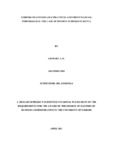| dc.description.abstract | Corporate governance can be defined as the stewardship responsibility of corporate directors to provide oversight for the goals and strategies of a company and to foster their implementation. Good corporate governance practices was nurtured and encouraged to evolve as a matter of best practice but certain aspects of operation in a body corporate were of necessity and required minimum standards of good governance. Pension was an arrangement to provide people with an income when they were no longer earning a regular income from employment. Among the various recommendations for regulation and supervision, one of the highest priorities was joining the International Organization of Pension Supervisors (IOPS) to benefit from international experience as well as developing policies and practices in two areas: the development of a better system for capturing, managing, and analyzing data, and moving to a more risk-based approach to supervision. Citizens needed to know the depth to which corporate governance practices had been entrenched in the firms that managed their very important contributions. Scholars and academicians also wished to use the findings of this study as a basis for further research on this subject. The specific areas covered included corporate governance in emerging economies, the interaction of different governance mechanisms, international organizational of pension scheme (IOPS), best practices, corporate governance index, corporate governance and stakeholders’ participation, role of corporate governance and relationship between governance mechanism and firm performance. The survey design was able to give results that were representative of a larger population. Primary data from the field was collected using semi-structured questionnaires. The researcher carried out a pilot study to pre-test and validate the questionnaire. The data was then coded to enable the responses to be grouped into various categories. The study concludes that corporate governance practices and firm financial performance were practiced in the case of pension schemes in Kenya. This study recommends that the government encourage various people to join the pension scheme since the aim of setting pension was to provide people with an income when they were no longer earning a regular income from employment. | en_US |



